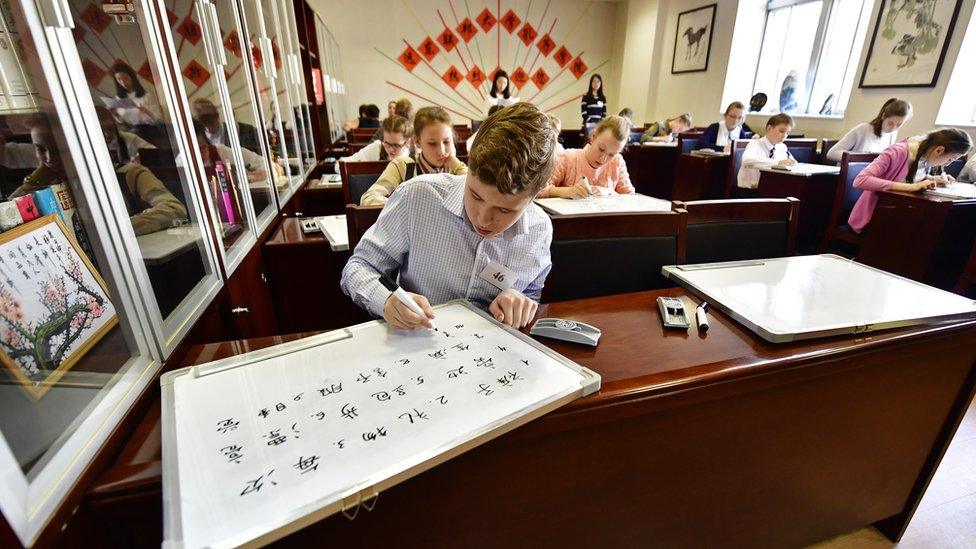Rishi Sunak u-turns on proposed ban on Chinese institutes
- Published

Concerns are growing about Chinese influence on academic campuses around the world
Rishi Sunak has backtracked on a pledge to shut down 30 Chinese state-sponsored Confucius Institutes across the UK.
The prime minister pledged, external to close the cultural schools, which are accused of spreading propaganda and spying on students, during his bid to become Conservative leader last year.
On Wednesday, the government announced it would be "disproportionate" to ban the institutes.
Senior Tory MP Sir Iain Duncan Smith called the decision "ridiculous".
Confucius Institutes, which teach Chinese language and culture, came under fire after critics and charities accused the centres of being used by the Chinese government to spread propaganda and interfere with free speech on campuses.
Sir Iain, the former Conservative party leader, said the schools were "nothing to do with language".
"They are there to spy on particularly on Chinese students and particularly Hong Kong students," he said.
The retreat, first reported by TalkTV, has been criticised by some Tory backbenchers, with former prime minister Liz Truss urging him to deliver on the language he used during last summer's contest.
In his unsuccessful leadership campaign, Mr Sunak had promised to close all 30 of the institutes in Britain, declaring China "the biggest-long term threat to Britain".
But since becoming prime minister he adopted less hard-line language. In March, the updated UK integrated review on foreign and defence policy described China as representing an "epoch-defining and systemic challenge" rather than a "threat".
Allow X content?
This article contains content provided by X. We ask for your permission before anything is loaded, as they may be using cookies and other technologies. You may want to read X’s cookie policy, external and privacy policy, external before accepting. To view this content choose ‘accept and continue’.
Ms Truss called on her successor to return to branding China as a "threat" to UK security during a visit to Taiwan.
Ms Truss made a speech in Taipei City on Wednesday, making her the first former prime minister to visit Taiwan since Margaret Thatcher.
In it she said Mr Sunak's approach to China was "right" during his leadership, and the UK "needs to see those policies enacted urgently".
She called on the UK government to support Taiwan joining the Comprehensive and Progressive Agreement for Trans-Pacific Partnership (CPTPP) trade agreement - and for it to block China from joining.
A Downing Street spokesman said: "We recognise concerns about overseas interference in our higher education sector, including through Confucius Institutes, and regularly assess the risks facing academia.
"We are taking action to remove any government funding from Confucius Institutes in the UK, but currently judge that it would be disproportionate to ban them.
"Like any international body operating in the UK, Confucius Institutes need to operate transparently and within the law, and with a full commitment to our values of openness and freedom of expression."
Mr Sunak said he had not "seen the details" of Ms Truss's speech, but said the UK's approach to Taiwan is "long-standing and it hasn't changed".
He said: "We do not believe in any change in the status quo by force or coercion. And we will continue to work with our allies in making sure that that's what happens."
The UK, like most other countries, does not recognise Taiwan, nor maintain formal diplomatic relations with the island. The UK does support Taiwan's participation in international organisations as an observer.
The government's official position , externalis the dispute between Taiwan and China should be resolved "through dialogue, in line with the views of the people on both sides of the Taiwan Strait".